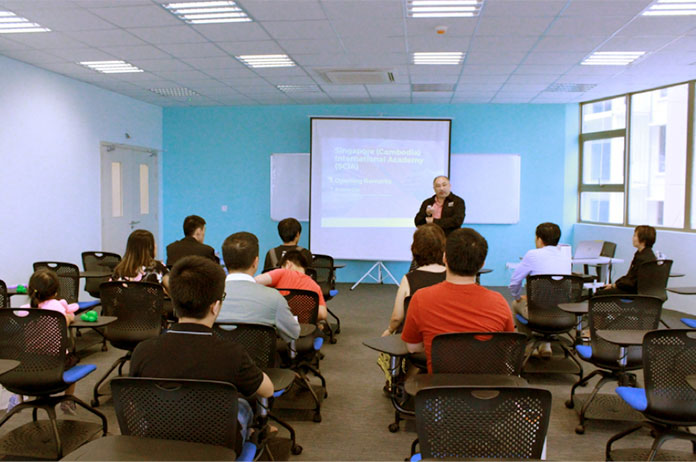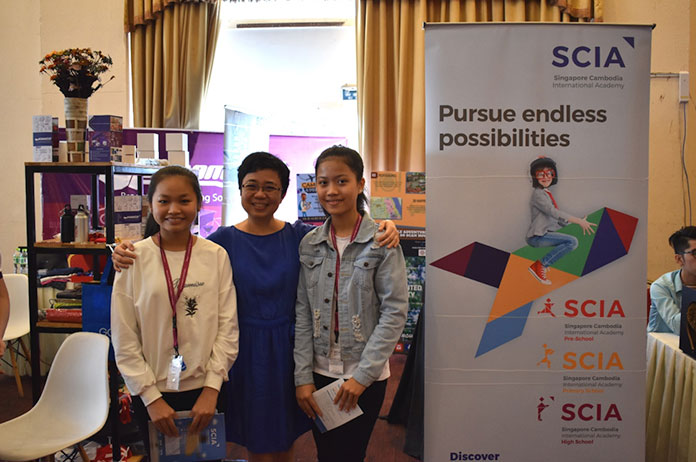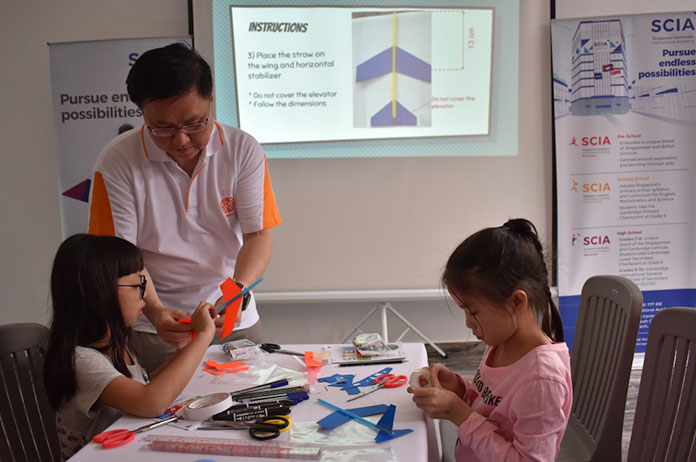Q&A: Anselm Chu, Managing Director & School Director, Singapore (Cambodia) International Academy

Singapore (Cambodia) International Academy (SCIA) is the first international school that offers a blend of authentic Singapore and Cambridge curriculum in Cambodia. SCIA is a member of the Singapore Institute of Management (SIM) Group, the leading provider of a diverse range of education pathways and professional training in Singapore.
Mr. Anselm Chu gave his welcome remarks at the recent Open House in July 2018. SCIA’s vibrant campus is strategically situated in the prestigious enclave of Phnom Penh City Center – One Park Condominium, and has accepted its first cohort of 150 students in mid-August 2018. B2B Cambodia sat down with Mr. Anselm Chu, Managing Director & School Director, to find out more about SCIA and the education it offers to Cambodia.
- What are the unique features that set your school apart from others?
SCIA provides students with a holistic education, infused with 21st Century competencies, which goes beyond classroom learning and grades. This is supported by our signature programmes in STEM (Science, Technology, Engineering, and Mathematics), Leadership, and Entrepreneurship. SCIA is backed by our parent company, the SIM Group. With more than 50 years of organisational excellence in private higher education, professional development, and the recent set-up of SIM International Academy in Singapore, our passion for inculcating the importance of lifelong learning and nurturing our students from a young age is evidently strong. We endeavour to be the leading institution that prepares individuals to be future-ready, maximising their potential and opening doors in life through education. We take pride in being an international school from Singapore with a committed team of school leaders who possess 15 to 20 years of teaching and management experience in Singapore government schools and international schools in the region. Our school leaders, assisted by certified and competent educators talent-scouted from all over the world, including Singapore, will ensure the authenticity of an integrated Singapore and international education.
2. How long have you been in Cambodia and what were the reasons for starting in Cambodia?
A key factor at play is the demographics: more than two-thirds of the population are below the age of 30, with a median age of 25. The education scene is also evolving with a progressive Ministry of Education, Youth & Sports (MoEYS) actively promoting STEM & ICT (Info-Communication Technology). We also see a growing interest among parents in recognising the importance of arts, humanities, entrepreneurship, and leadership for their children. In the near future, we look to offering higher education and continuing education for society.
Since February 2017, the SIM Group has examined the potential of several countries in Asia and in the Indo-China region. Compared to its neighbours, the Cambodian economy is opening up rapidly. The government is relatively stable and pro-business. Coupled with the steady growth in GDP, tourist arrivals, and direct foreign investments, it gave us greater confidence to enter the market. In addition, many Cambodian families have been interested in sending their children to Singapore to experience the education system there. This means families would be separated, with a possibility of young children being in the care of guardians in Singapore. Through our physical presence in Phnom Penh, SCIA keeps families with young children intact.
While SIM can make a difference in some countries, we firmly believe we can make a greater difference in Cambodia. This is even more so, with our twin mission of “Doing Good” and “Doing Well.” SCIA is also committed to a full spectrum of Corporate Social Responsibility (CSR) initiatives. These include providing Scholarships and promoting CSR efforts to support causes for education, youth, and children.

3. How does SCIA support students with different learning styles and needs?
SCIA employs an inquiry-based approach and differentiated instructions in the classroom. Our teachers are well-versed in teaching in mixed-ability classrooms. Lessons are designed based on our educators’ assessment and understanding of students’ needs and learning styles. Students are then grouped according to their shared interests, topics, or learning abilities for assignments. This approach provides opportunities for tailored learning activities that cater to the students' strengths while still attaining the same learning objectives.
SCIA also offers enrichment classes to further enhance student learning. The SCIA Booster series focuses on core subjects, providing additional grounding, coaching, and support for academic success. The SCIA Extension series goes beyond the basic subject syllabi and may cover more advanced topics, offering a platform for like-minded students to meet and mutually develop their interests.
Additionally, SCIA has put in place talent development programmes aimed at discovering and nurturing students’ strengths and potential in academics, leadership, and entrepreneurship.
4. SCIA places an emphasis on trilingual education. In your opinion, what are the key benefits of children and students receiving a trilingual education from an early age?
At SCIA, we offer a trilingual education – English, Chinese, and Khmer. While we prepare our students to be future-ready, we also emphasise the importance of embracing Cambodian culture through learning the Khmer language. As China continues to play a key role in international economics with the One Belt One Road (OBOR) initiative, the Chinese language is becoming increasingly important in business communications.
Research has shown that learning two or more languages at a young age significantly impacts children’s cognitive development. It enhances problem-solving skills, multitasking abilities, and overall cognitive flexibility. This approach ensures that our students are well-equipped to thrive in a globalized world.
5. Are there any new programmes/facilities in SCIA that you would like to share?
Nestled in the heart of One Park, Phnom Penh City Center, SCIA’s spaces are designed to encourage creative thinking, innovation, collaboration, and communication. Our vibrant city campus is surrounded by retail outlets, cafés, and restaurants, creating an enriching environment for students.
Some of our key facilities include a 300-seater auditorium, a multipurpose hub, a makerspace, and an International Assembly Space for Model United Nations. These facilities are designed to foster interactive learning and a dynamic school culture.
Additionally, SCIA has a strategic partnership with the Singapore Science Centre to start a mini Science Centre at SCIA, launching a wide spectrum of STEM-related programmes. Through this partnership, SCIA also plans to assist other schools in Phnom Penh to enhance their STEM Teaching & Learning.
We have also successfully organized two Teen Entrepreneur Challenges, where participants come up with new business ideas using Design Thinking, assisted by SCIA educators. These challenges encourage creativity and entrepreneurship among our students, and we plan to continue hosting these events in the future.

SCIA is offering scholarships and study awards for January 2019 admission. Interested applicants are invited to attend the scholarship information session on:
- 8 September and 29 September, from 10:00 AM – 11:30 AM.
For further inquiries, you can contact:
- Phone: (855) 61 777 860
- Email: scia.scholarship@sim.edu.sg
- Website: SCIA Scholarships
[1] Concordia University. (2018, February 6). Bilingualism could offset brain changes in Alzheimer's: A study sheds light on how language history relates to brain plasticity. Science Daily. Retrieved July 19, 2018 from www.sciencedaily.com/releases/2018/02/180206140713.htm.